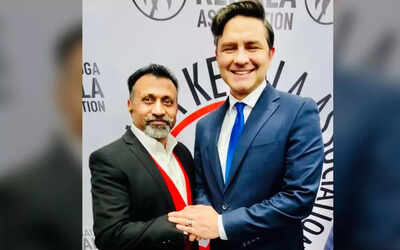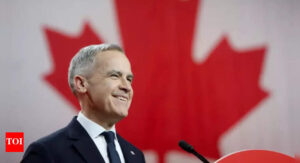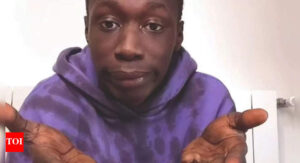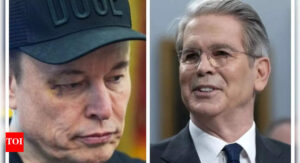Extremism In Canada: Canada Election 2025: Why Conservative candidate Don Patel was dropped for heart-hugging emoji | World News

Don Patel, the Conservative Party’s candidate for Etobicoke North, was removed from the 2025 federal election campaign after endorsing a controversial social media post that called for the deportation of certain individuals to India.
The post — vague in its language but widely interpreted as referring to Khalistani supporters — read: “Should be stop these people by Canadian government and deported to India then PM Modi can take care of these non-sense people.” Patel responded with a heart-hugging emoji, a gesture interpreted as support.
While the Conservative Party acted swiftly to drop Patel, calling his engagement with the post “clearly unacceptable,” the incident taps into a far more complex and volatile political reality — one that has shaped Canada’s domestic discourse and foreign policy for decades: the shadow of the Khalistan movement and its ties to terrorism, extremism, and diplomatic fallout.
Khalistan Is Not Just a Movement
The Khalistan movement — which advocates for an independent Sikh state carved out of India’s Punjab — is often painted in Canada as a freedom struggle or diasporic identity cause. But in India, and among large sections of the South Asian community in Canada, it carries far darker connotations.
In 1985, Khalistani extremists were responsible for the bombing of Air India Flight 182, also known as Air Kanishka, which exploded off the coast of Ireland, killing 329 people, including 268 Canadians. It remains the deadliest act of aviation terrorism before 9/11 — and the worst mass killing in Canadian history. Despite overwhelming evidence and a lengthy investigation, only one person was convicted. The rest either walked free or were never tried. For many, the lack of justice remains an open wound, especially within the Indo-Canadian community.
To this day, the attack is a chilling reminder that Khalistan is not just an idea — it has been weaponized, quite literally, to devastating effect.
Nijjar and Pakistan: The Missing Context
The issue gained new life in 2023, when Prime Minister Justin Trudeau accused Indian government agents of assassinating Hardeep Singh Nijjar, a Canadian citizen and a prominent Khalistan activist, outside a Sikh temple in British Columbia. The charge triggered a diplomatic firestorm. India vehemently denied the allegations and pointed to Nijjar’s history of extremism — a history often sanitized in Canadian public discourse.
Indian intelligence reports claim that Nijjar was not merely an activist but was receiving arms training in Pakistan, under the protection of groups hostile to both India and the West. He was reportedly linked to efforts to revive Sikh militancy and recruit for separatist causes from Canadian soil. A Canada commission report later concluded that there was no ‘definitive link’ between any foreign hand and Nijjar’s assassination.
While Canada’s position has focused on the principle of sovereignty and the rule of law, India has maintained that its core concern is the growing use of Canadian territory as a safe haven for extremist networks — a concern echoed by many Indian-origin Canadians who feel their voices are drowned out by politically mobilized fringe groups.
A Symptom of a Larger Problem
Patel’s post reflects a simmering frustration in some corners of the diaspora. The belief that Canada has turned a blind eye to extremism — in part due to political expediency — is not isolated to Delhi. Many Indo-Canadians, particularly Hindus and moderate Sikhs, have grown increasingly uneasy with the Canadian politicians’ perceived softness on Khalistani extremism. Ironically, Patel’s removal was likely a bid to prevent his statement from playing into Liberal attacks, but the damage is done. It reinforces the perception that Canada’s political parties are deeply entangled in diaspora vote-bank politics — where foreign conflicts are imported and amplified for domestic gain.
Trudeau’s India Problem

“Clandestine info-gathering techniques, coercive tactics targeting Canadians”: Trudeau accuses India amid diplomatic row
All of this unfolds against the backdrop of former PM Justin Trudeau’s own spectacular fall from grace — a decline in which India played a central role. His 2018 India visit, remembered more for Bollywood costumes than diplomacy, first exposed the Trudeau government’s naivety on South Asian geopolitics. His 2023 Nijjar allegation turned naivety into outright rupture.
Trudeau’s attempt to walk the tightrope — appeasing domestic Khalistani activists while maintaining bilateral ties — collapsed under the weight of realpolitik. India retaliated by cutting visas, expelling diplomats, and cancelling trade talks. Even traditional allies like the U.S. and Australia were tepid in their support, unwilling to sacrifice relations with India for Trudeau’s crusade.
The Fire Is Still Burning
Don Patel’s removal is not the end of this story — it’s merely another flare-up in a fire that has been smouldering for decades. As Canada heads into the 2025 election, the nation must confront uncomfortable truths: that diaspora politics have consequences, that extremism can hide in plain sight, and that failing to reckon with history — from Air India to Nijjar — invites its repetition.
In this volatile mix, politicians like Don Patel may come and go, but the deeper reckoning still lies ahead.








